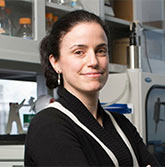Series to Highlight Women in Signal Processing: Interview with Prof. Elisa E. Konofagou

 Elisa E. Konofagou is the Robert and Margaret Hariri Professor of Biomedical Engineering and Professor Radiology as well as Director of the Ultrasound and Elasticity Imaging Laboratory at Columbia. Her main interests are in the development of novel elasticity imaging techniques and therapeutic ultrasound methods. Elisa is an Elected Member of the National Academy of Medicine, Elected Fellow of the Institute of Electrical and Electronic Engineers (IEEE), the American Institute of Biological and Medical Engineering (AIMBE) and of the Acoustical Society of America. She has co-authored over 260 published articles in the aforementioned fields.
Elisa E. Konofagou is the Robert and Margaret Hariri Professor of Biomedical Engineering and Professor Radiology as well as Director of the Ultrasound and Elasticity Imaging Laboratory at Columbia. Her main interests are in the development of novel elasticity imaging techniques and therapeutic ultrasound methods. Elisa is an Elected Member of the National Academy of Medicine, Elected Fellow of the Institute of Electrical and Electronic Engineers (IEEE), the American Institute of Biological and Medical Engineering (AIMBE) and of the Acoustical Society of America. She has co-authored over 260 published articles in the aforementioned fields.
We approached Prof. Elisa Konofagou with a few questions to learn more:
1) What was the most important factor in your success?
Continuous support by my family. I think it is extremely important to have someone there (it doesn’t have to be a family member by the way, it can be a friend or mentor or anyone else who gets your talent and dedication) who lifts you up when life or your career or sometimes both throw wrenches in your path. Another important factor is mentors who you can guide you through your career and offer good advice about choices, decisions or overall paths. A mentor is anyone who is willing to listen to your needs or concerns and offer a helping hand or a good advice.
2) Failures are an inevitable part of everyone’s career journey, what is the most important lesson you have learned during your career when dealing with failures?
To never give up. And I am very keenly aware that this is much easier said than done, especially by someone who is not necessarily in your position or your conundrum. But in the end you learn that failures lead you to who you are, who is hopefully a person who perseveres through struggles. With my students and in workshops, I sometimes jokingly say if nobody believes you but you know you have discovered or invented something new, trust in your eyes and patent it. Typically, we all are guilty of this initial negative reaction: we are naysayers when we first see something but then we become the biggest fans when we see it work over and over again. The difference is that we are sometimes the only person in the world who sees something working for the first time and if we don’t believe it or doubt ourselves too much, someone else will claim it.
3) Please share your work of societal impact with us.
I really believe in passing the scientific research bug to the new generations as well as developing technology that is accessible to the majority. I call ultrasound the soccer of imaging because you typically use a very portable system, or even pocketable these days, to image in the clinic. These days, energy and carbon neutrality are so important and ultrasound is by far the most sustainable of modalities. Ultrasound can be simply be powered by an iPhone battery.
4) What were the main changes in your field during the last 25-30 years?
There were several. The main one was miniaturizing the ultrasound scanner to a smart phone use as I mentioned earlier. This happened with very smart hardware engineering. It is amazing to think that ultrasound can be also embedded in smart watches and other accessories that anybody can use at home, on the run or in the clinic foe everyday use one day. The other aspect is functional imaging instead of only anatomical. The main advantage of ultrasound is its sound speed which was not sufficiently harnessed except in Doppler flow previously. Now, we know that thousands images per second are essential in getting rapid cardiac events such as electrical stimulation or visualize small blood vessels in the brain 10 times below the resolution limit. One more breakthrough in the last 30 years is in ultrasound therapeutics that has now crossed to the clinic. Therapeutic ultrasound is a much older technology than ultrasound imaging but took a lot longer to translate because of the lack of monitoring techniques. Now, it is routinely used for ablation of essential tremors in the brain, prostate cancer and palliative treatment of bone metastases.
5) During these COVID times, the teaching and learning has become online for some time now. What do you think are some of the challenges being faced in carrying out quality teaching as well as quality research? Do you have any suggestions for students and faculty?
These have been very hard times for both teaching and learning, for both students and professors. Last year, I taught a whole course with never meeting the students in person which was previously unheard of. It is very hard for all of us to be focused using a screen for extended periods of time. Typically, fatigue sets in and I have found that only 30% gets conveyed virtually compared to in person. The students get increasingly disconnected and frustrated with the fact that simple concepts are simply harder to grasp and fully understand virtually. The current policy of in person and quarantining when found positive is much more reasonable and I saw a big difference this past semester when we were in a classroom hashing out concepts and important principles. So, my recommendation is make the effort to get back to the habit of meeting the students in person, it makes such a huge difference in their training and overall learning.
To learn more about Prof. Elisa Konofagou, please visit her webpage.

